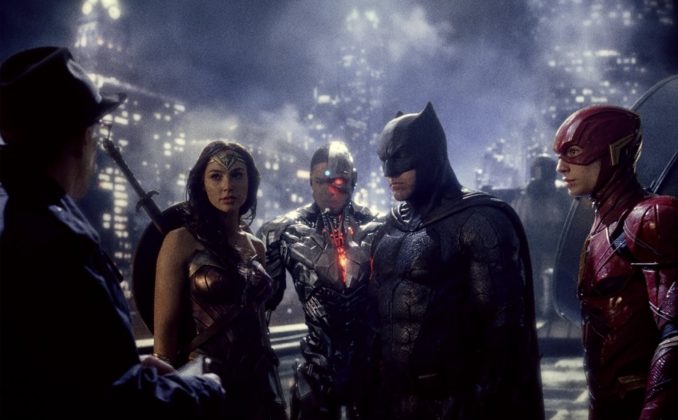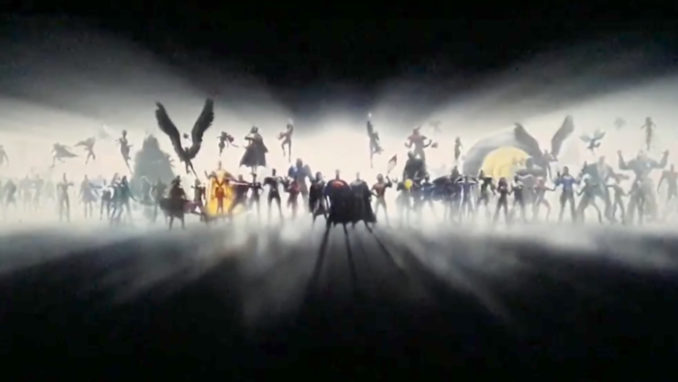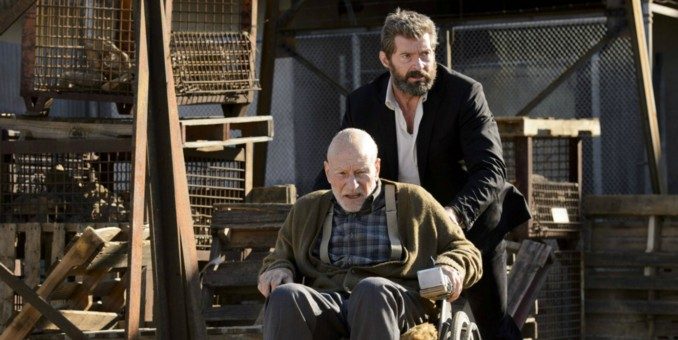 If there is one constant in Hollywood, it’s that money gets things done. So, if we want some idea where Hollywood is going in the future, we have to look at the highest grossing films of 2017. What secrets do they hold? What truths do they tell? Let’s find out.
If there is one constant in Hollywood, it’s that money gets things done. So, if we want some idea where Hollywood is going in the future, we have to look at the highest grossing films of 2017. What secrets do they hold? What truths do they tell? Let’s find out.
Below is the list of the top ten domestic grossing films of 2017, courtesy of Box Office Mojo (captured 1/1/18):

So, what does this tell us?
1. Don’t fear a Disney monopoly, because it is already here.
 The news of Disney’s purchase of 21st Century Fox’s assets have had a lot of pundits worrying about a monopoly by the House of the Mouse. They should stop worrying, because Disney already has a monopoly of sorts.
The news of Disney’s purchase of 21st Century Fox’s assets have had a lot of pundits worrying about a monopoly by the House of the Mouse. They should stop worrying, because Disney already has a monopoly of sorts.
Check out that list above. Anything with “BV” under studio came from Disney. That means four out of the 10 films came from them. And since they also had a had in making Spider-Man: Homecoming, we can safely bump up that number up to five films. Yes, right now, way before the Fox buyout is official, Disney has its hands in half of the top ten films of the year. Six if you count Logan, which was licensed to Fox.
So, yeah, calls to try and stop a Disney monopoly should have started back before they bought out Marvel Studios and Lucasfilms. Because they already control a majority of the intellectual properties people want to see.
2. The Force is strong. Very, very strong.
 The fact that Star Wars: The Last Jedi is the number one film of 2017 shouldn’t be that much of a surprise. But the fact that it got there after just two weeks of release should be. It made over $530 million in just two weeks. That is $26 million more than Beauty and the Beast made in its four-month run in theaters. That more than Despicable Me 3 and Logan made in their theatrical runs combined. As a matter of fact, the film has already broken the billion dollar mark worldwide. That is astounding.
The fact that Star Wars: The Last Jedi is the number one film of 2017 shouldn’t be that much of a surprise. But the fact that it got there after just two weeks of release should be. It made over $530 million in just two weeks. That is $26 million more than Beauty and the Beast made in its four-month run in theaters. That more than Despicable Me 3 and Logan made in their theatrical runs combined. As a matter of fact, the film has already broken the billion dollar mark worldwide. That is astounding.
That makes the estimated $4 billion Disney paid for the Star Wars franchise seem like the bargain of the century, because it is an evergreen money-making machine.
So, if you are a hardcore Star Wars fan who is upset because Luke was too mopey in the film, and you will no longer spend any money of the franchise until they bend to your will, go right ahead. However much you spend, it’s just a drop in the bucket. Your boycott won’t hurt them in the least.
3. We might be seeing the end of the CGI Animated film as a dominant box office force.
 Despicable Me 3 was the sole computer animated film in the top ten. And this was a year with two Pixar films (Cars 3 and Coco) and two LEGO movies (The LEGO Batman Movie and The LEGO Ninjago Movie) in the mix Also, the amount that Despicable Me 3 earned wouldn’t have even earned it a spot in last year’s top ten, a year which featured 4 CGI animated films in the top ten.
Despicable Me 3 was the sole computer animated film in the top ten. And this was a year with two Pixar films (Cars 3 and Coco) and two LEGO movies (The LEGO Batman Movie and The LEGO Ninjago Movie) in the mix Also, the amount that Despicable Me 3 earned wouldn’t have even earned it a spot in last year’s top ten, a year which featured 4 CGI animated films in the top ten.
What cause this? Well, part of it is due to market saturation. There were fourteen computer animated cartoons released last year, and in the rush to tap into a lucrative market, the franchise tent poles and creative originals got lost in a sea of poorly made domestic films (The Emoji Movie, The Nut Job: Nutty By Nature) and cheap foreign-foreign made entries (Leap!, Rock Dog). And, let us not forget that families enjoy superhero films and Star Wars epics too.
Last year, I was championing the computer animated feature as a box office champion. But that might have been the top of the arc. Will this be the year the CGI family film loses its hold on the box office? Maybe. More competition means it will take more of an effort to break in the top ten.
4. Comic book adaptations rule (at least if they are Marvel or DC Comics comic books).
 Comic book film once again established their dominance at the box office, with six out of the ten spots on the top ten list taken up by them. But all six were films adapted from Marvel Comics or DC Comics books. To find a film adapted from a comic book outside the big two, we have to scan all the way down to #49 to find Atomic Blonde.
Comic book film once again established their dominance at the box office, with six out of the ten spots on the top ten list taken up by them. But all six were films adapted from Marvel Comics or DC Comics books. To find a film adapted from a comic book outside the big two, we have to scan all the way down to #49 to find Atomic Blonde.
Nothing sells like success and many studios are looking to find a comic book franchise of their very own. However, the rights to the comic book industry gold standard of DC and Marvel are already owned by Warner Brothers, Disney, Fox and Marvel. There are a wide variety of other publishers to choose from outside of them, but the ever-popular superheroes are hard to find at these companies.
There have been successes from the indie market in the past–Kick-Ass, Kingsman and Hellboy to name three. The latter will be rebooted for the big screen in 2019. The continued success of the comic book film will hinge on the success of that reboot.
5. Wonder Woman shows a woman CAN open an ____________ (Fill in the blank).
 Films with female protagonists don’t sell tickets. They especially don’t sell tickets to action movies. Or superhero films. And to try to establish a tent pole franchise with a woman in the lead is madness.
Films with female protagonists don’t sell tickets. They especially don’t sell tickets to action movies. Or superhero films. And to try to establish a tent pole franchise with a woman in the lead is madness.
Leave to Wonder Woman to (hopefully) put that all to rest.
I put “hopefully” in parenthesis because there are a lot of excuses the male-driven Hollywood executives could use to prove that the success of Wonder Woman is an exception. “The character is a cultural icon!” “She part of a shared universe!” “She has a built in audience that other female characters do not have.”
I call shenanigans. Wonder Woman succeeded because it was a great movie with an interesting lead character that the audience could root for. That should be what is more important, not the character’s chromosomal make up.
But the “women can’t open movies” argument didn’t die down after The Hunger Games raked in money hand over fist. It might be up to next year’s Tomb Raider reboot and Ocean’s 8 to put the final nail in that particular myth’s coffin.
6. Justice League shows a hit can be a miss.
 Justice League‘s almost $226 domestic gross is the envy of many a movie studio. Its nearly $653 million worldwide take should have made it a blockbuster hit. But it is seen as a disappointment.
Justice League‘s almost $226 domestic gross is the envy of many a movie studio. Its nearly $653 million worldwide take should have made it a blockbuster hit. But it is seen as a disappointment.
Why? Well, because the film’s budget is estimated to be anywhere from $300 million to $400 million dollars. Warners decided to throw good money after bad at the film, fully expecting the iconic gathering of characters that there world knew and loved would easily clear $1 billion in grosses. But since the studio threw that money at pricey CGI mustache removal and reshoots instead of more than Cliff’s Notes versions of the character’s backstories or a villain audiences might find interesting, it never had the chance to reach that billion dollar plateau.
But do not fret, because we can learn from this…
7. But both films shows the way Warners can compete with Marvel Studios.
 Wonder Woman was far more successful than Justice League not just because it made far more money. It was more successful because since it was a girly-girly girl film, Warners only allotted a $149 million budget to it, which is on the low side for a comic book film. That meant the filmmakers had to make a tighter, less self-indulgent film, one that would deliver more bang to the audience for its buck. Wonder Woman was forced to be a better film because it didn’t have unfettered access to Warners’ bank vault or expectations of breaking it big at the box office.
Wonder Woman was far more successful than Justice League not just because it made far more money. It was more successful because since it was a girly-girly girl film, Warners only allotted a $149 million budget to it, which is on the low side for a comic book film. That meant the filmmakers had to make a tighter, less self-indulgent film, one that would deliver more bang to the audience for its buck. Wonder Woman was forced to be a better film because it didn’t have unfettered access to Warners’ bank vault or expectations of breaking it big at the box office.
Am I saying that Warners should treat every DC Extended Universe film as a girly-girly girl film? Yes, yes I am. At least in the sense of keeping their budgets under control and using those budget constraints to make a less bloated movie. If Justice League had a budget in the $200 million range, it would have made 3 times its budget back. That’s a hit in any studio’s ledger.
I’m not a Marvel Studios fanboy who hates everything DC Comics–the shirt I’m wearing as I write this is emblazoned with the Superman shield–I just want Warners to finally and definitively right the ship when it comes to their DC films. They are almost there. They just have to adjust their attitude and expectations a bit. They have the most iconic superheroes in the business. But if they think that they will bring in billions even if they are delivered in substandard products, eventually, the DCEU will not be cost-efficient to continue.
8. It shows that Stephen King can work if done well (and is remade).
 2017 was a weird year for Stephen King film adaptations. If you were asked at the beginning of the year which King adaption would make more money–the long-awaited film debut of the author’s magnum opus The Dark Tower starring Matthew McConaughey and Idris Elba or the starless remake of It, which already appeared on the small screen, I’d wager my money on The Dark Tower.
2017 was a weird year for Stephen King film adaptations. If you were asked at the beginning of the year which King adaption would make more money–the long-awaited film debut of the author’s magnum opus The Dark Tower starring Matthew McConaughey and Idris Elba or the starless remake of It, which already appeared on the small screen, I’d wager my money on The Dark Tower.
Of course, I would have been wrong.
The Dark Tower, even after ten years of development, wasn’t a true adaptation of the series of novels, but rather a confusing, PG-13 rated sequel to the books that angered the faithful and left newcomers lost. It couldn’t quite double its $60 million budget. It was an R-rated film eight years in the making, made by fans of the original book that stayed true to not only the scares but also the heart of the source material. the film broke all sorts of box office records, making $698 million worldwide on a $35 million budget, just under 20 times a return on its investment.
What happened? Well, moviegoers were probably more familiar with It from the TV mini-series, but the R-rating allowed the tale of a clown that eats children to be more faithful to the original story than network TV would allow. Therefore, both the King faithful and the uninitiated would enjoy the film.
9. Logan expands on what a comic book film can do.
 You’ll see a lot of articles about Disney buying Fox where fans lament that the R-rated Marvel film that Fox spearheaded with Deadpool would go away forever. They should be far more worried about another trend Fox started going away.
You’ll see a lot of articles about Disney buying Fox where fans lament that the R-rated Marvel film that Fox spearheaded with Deadpool would go away forever. They should be far more worried about another trend Fox started going away.
When Logan came out, I didn’t give it all that great a review. I thought that it dragged a bit longer than it should have, which exposed a number of its flaws. But that doesn’t mean I don’t admire what Fox did with the film. It recast Wolverine as a sorta cowboy at the end of his days, and Unforgiven for superhero set. It protagonist was a beaten and broken man, just trying to do one last good thing–taking care of his mentor, before another person in need of his help comes along and dooms them all.
This is what I will miss about an independent Fox working its Marvel license. They had just begun to expand the boundaries of what a Marvel comic book film would be. Deadpool started, Logan benefited from it, and New Mutants looks to continue the trend, taking the comic book film into the realm of horror. But Disney? Disney won’t allow Iron Man to become a skid row drunk or Captain America become an authoritarian Nazi or even have Black Widow star in an R-rated espionage thriller. There are too many toys to sell. This sense of adventure might go away.
Bob Iger said that there would be room for R-rated Marvel films if and when the sale goes through. I hope also there will be room for filmmakers to take non-conventional approaches to their characters as well.
10. Beauty and the Beast firmly establishes the live-action remake of a Disney cartoons as a sure-fire money maker.
 If it wasn’t for that dastardly Star Wars: The Last Jedi and its last-minute box office push, Beauty and the Beast would have been they #1 film on that list up there.
If it wasn’t for that dastardly Star Wars: The Last Jedi and its last-minute box office push, Beauty and the Beast would have been they #1 film on that list up there.
This is a culmination of four years of Disney live-action remakes of their classic cartoons landing in the Top Ten Grossers, starting in 2014 with Maleficent, continuing the next year with Cinderella and last year with The Jungle Book. Except for a slight dip in 2015 with Cinderella, each film did better at the box office than the last and continued to rise up the top ten list.
If you are annoyed by this trend, well, you are going to have to try and get over it. We will be getting a live-action Mulan remake next year and three—yes, three–live action remakes in 2019: Dumbo, Aladdin and The Lion King.



